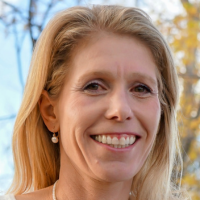
University of Colorado │ Boulder, Colorado
For making transformative contributions to restoration ecology by increasing our understanding of degraded ecosystems and their recovery dynamics. Her work addresses urgent environmental and societal challenges, and guides policies and practices of ecological restoration, biodiversity conservation, and sustainable ecosystem management.
Growing up, Katharine Suding first experienced the natural beauty of western U.S. landscapes while tagging along with her geologist father on expeditions to old mine sites in the dry vast hinterlands. In the decades since, she has witnessed these same ecosystems, once pristine, become degraded due to human activity and environmental change. The problem is not unique to the American West. Ecosystems around the world are losing biodiversity and ecological complexity, posing significant risks for humanity's pollinators, water sources, and arable soils.
Suding became an ecologist partly to address the issue of Earth’s declining ecosystems, joining a budding field called restoration ecology. She rose to become one of its pioneering voices, transforming it through groundbreaking experimentation, meticulous data analysis, and pragmatic land management strategies that have reshaped how scientists understand and heal damaged ecosystems. Her innovative research, often conducted in the overlooked corners of grasslands of the American West, has illuminated the complex interactions that govern ecosystem recovery, yielding insights vital for managing habitats in an era of rapid global change.
Raised with a deep curiosity about nature and the outdoors, Suding pursued an academic path that intertwined ecological theory with hands-on fieldwork. After earning her undergraduate degree at Williams College, she continued her academic journey at the University of Michigan, where she earned her Ph.D. in ecology in 1999. It was there that Suding began exploring the hidden rules behind plant communities and how disturbances like climate change, invasive species, and human activity influence biodiversity and ecosystem function.
Upon completing her doctoral studies, Suding’s interests turned toward the intersection of ecology, conservation biology, and environmental management. Restoration ecology, at the time, was largely defined by idealistic assumptions that ecosystems could be returned to stable, pristine states. By simply cordoning off a disrupted ecosystem, the thinking went, nature would recover. Suding challenged these ideas, recognizing that ecosystems are inherently dynamic, their recovery often unpredictable, nonlinear, and deeply influenced by a range of interacting factors.
Arriving at the University of California, Irvine as a faculty member in 2004, Suding began reshaping the theoretical foundations of restoration ecology. Her early work demonstrated the power of detailed, long-term ecological datasets to unravel complex relationships within ecosystems. Rather than relying solely on theoretical predictions, she championed rigorous empirical data collection, emphasizing the value of granular datasets that captured subtleties in plant-soil relationships, community dynamics, and ecological resilience. This empirical rigor transformed restoration ecology into a more predictive and reliable science, bridging the gap between abstract theory and tangible management practices.
After five years at the University of California, Berkeley, in 2014, Suding joined the faculty at the University of Colorado, a pivotal move that immersed her directly in the grasslands that she had explored during childhood. Undulating prairie at the edge of the Rocky Mountains, amid fields of swaying grasses punctuated by bright splashes of wildflowers and the occasional cattle, Suding and her research team established extensive experimental plots. These sites, nestled among the granite peaks and sprawling meadows of the Rocky Mountains, provided an ideal laboratory for studying how ecosystems respond to disturbances such as climate change, nitrogen deposition, and invasive species encroachment.
Working in Colorado’s high prairie required both scientific rigor and ecological sensitivity. Suding combined carefully controlled experiments with meticulous observations, recording every subtle shift in plant composition, soil nutrients, and microbial communities. Her detailed investigations illuminated previously hidden dynamics—such as the role certain plant species play as “ecosystem engineers,” stabilizing soils, influencing nutrient cycles, and facilitating the recovery of diverse ecological communities.
One hallmark of Suding’s groundbreaking approach was her focus on thresholds and feedback loops. Her experiments showed that ecosystems sometimes pass critical tipping points, beyond which recovery becomes significantly more challenging. In other words, restoring an ecosystem isn't always possible. Recognizing the thresholds enables restoration managers to intervene strategically before the damage becomes irreversible. Where irreparable degradation occurs, Suding has pioneered a pragmatic philosophy of restoring ecosystems, if not backward, then toward a goal of resilience. What this looks like is different for every ecosystem, but procedures generally employ research-backed modifications to ecological constituents aimed at fostering a state of robust complexity that will stand against pressures both present and expected, including human goals for the land.
Recognizing that restoration must be achievable in real-world scenarios, Suding has partnered closely with land managers, conservation organizations, and government agencies, guiding restoration plans across diverse ecosystems, from alpine tundra to grasslands and agricultural lands, significantly improving conservation outcomes far beyond the Rocky Mountains. Her detailed analyses and empirical datasets have become foundational resources for scientists and land managers alike, widely cited as definitive evidence of how ecosystems respond to disturbances and restorative efforts.
The importance and far-reaching impact of Suding’s work have been recognized with a range of accolades, including fellowship in the Ecological Society of America, the British Ecological Society, and the American Association for the Advancement of Science.
Today, ecosystems worldwide are facing unprecedented pressures from climate change, invasive species, and human encroachment. Katharine Suding’s pioneering approaches illuminate paths toward resilient, sustainable ecosystems capable of adapting to the ever-changing conditions of the modern world.
Information as of April 2025.

